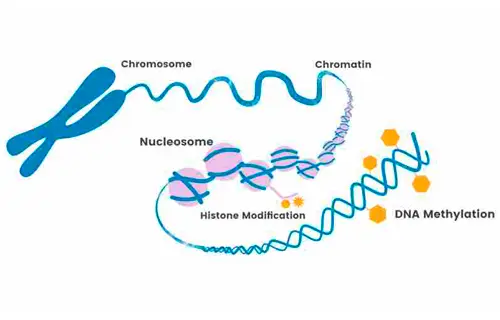DNA methylation genes

If you tested your DNA with a personal genomics service like 23andMe, AncestryDNA, FamilyTreeDNA, MyHeritage or another testing company, you can learn more about your risk factors for hundreds of diseases. By clicking the button above ⬆️, you can upload your raw DNA data file and receive a personalized 250-page health report with research links that is the most comprehensive.
The Genetic Methylation Check examines your DNA to offer insights into your unique methylation pathways. Methylation is a crucial process that enables your genes to function optimally. Therefore, gaining an understanding of your individual methylation pathways is essential for optimizing your health. Humans possess approximately 20,000 genes, among which MTHFR is responsible for aiding the body in processing folate. Regrettably, 30-60 percent of individuals carry an MTHFR gene variant, potentially resulting in decreased levels of folate and B vitamins, along with elevated levels of homocysteine in the bloodstream. As a consequence, mutations in the MTHFR gene can predispose individuals to an increased risk of various common health issues over time, including preventable heart disease, colon cancer, stroke, Alzheimer's disease, and more. Two primary genetic variations of the MTHFR gene have been identified, both linked to changes in MTHFR enzyme function and folate metabolism. The first is the C677T mutation, where a cytosine (C) is substituted by a thymine (T) nucleotide at position 677 of the MTFHR gene, leading to an alteration of amino acid (alanine replaced by valine) in the MTHFR protein structure. This variation is relatively common; in the United States, 25% of Hispanics and 10-15% of Caucasians carry two copies of C677T. Individuals with homozygous mutations (C677TT) exhibit a 30% reduction in MTHFR enzyme function, while those with heterozygous mutations (C677CT) show 65% enzyme activity.
The second common MTHFR polymorphism is A1298C, where an adenine (A) is replaced by a cytosine (C) nucleotide at position 1298 of the MTHFR gene, leading to an amino acid change (glutamate replaced by alanine) in MTHFR's structure. The MTHFR 1298C polymorphism is present in about 25% of the global population. Heterozygous (A1298AC) and homozygous (A1298CC) carriers experience a reduction in MTHFR activity of 15% and 30%, respectively. Genetic testing is necessary to assess the MTHFR gene for mutations. This can be achieved through a blood or saliva test. The test typically evaluates two different genes, C677T and A1298C, each of which has two copies. A mutation involving both copies of a gene is termed a homozygous mutation, while involvement of only one copy is termed a heterozygous mutation. Elevated homocysteine levels in the blood may indicate an SNP in the MTHFR gene, but direct testing for the SNP is the gold standard.
It's important to recognize that this mutation is hereditary and can be passed down through family members. However, we can mitigate the impact of these genetic mutations by supporting the methylation process through dietary interventions and supplements. It's crucial to remember that our genetic makeup does not solely determine our health outcomes—diet and nutrients play a significant role in influencing gene expression.
Follow the link of the selected polymorphism to read a brief description of how the selected polymorphism affects Methylation and homocysteine and see a list of existing studies.
SNP polymorphisms related to the topic Methylation and homocysteine:
| rs4680 | The study showed a 10% increase in total plasma homocysteine (tHcy) |
| rs819171 | The risk allele reduces the activity of the AHCY gene, which can decrease the formation of S-adenosylmethionine (SAM-e), and in turn increase the accumulation of homocysteine and ammonia in the body. SAM-e deficiency has been linked to a variety of health disorders including depression, mood swings, arthritis and fibromyalgia. |
| rs1051266 | The protein encoded by the gene transports folic acid into the cell and thus plays a role in the intracellular regulation of folate concentration. In this genotype, folate absorption is worse. Folic acid requirement is higher. Alcohol consumption is more critical for the risk of vitamin B9 deficiency. |
| rs17367504 | The polymorphism is associated with increased plasma homocysteine and increased risk of hypertension. |
| rs2274976 | The polymorphism is associated with an increase in plasma homocysteine dependent on vitamin B12 and folate B9. |
| rs3741049 | The gene defect causes 3-ketothiolase deficiency, which causes the growth of intestinal microbes (especially clostridia) and negatively affects methylation. |
| rs651852 | The detected genotype contains a risk allele, which potentially reduces the efficiency of the methylation process and may impair health. The activity of this gene may be reduced by psychological stress, which increases cortisol levels |
| rs567754 | The detected C/T genotype contains a risky "T" allele, which potentially reduces the efficiency of the methylation process and may impair health outcomes. |
| rs1801131 | Reduces the formation of the active form of folic acid, which is necessary for the remethylation of homocysteine and other DNA molecules. Administration of the active form of folic acid (5-MTHF or L-methyltetrahydrofolate) can significantly improve risk scores for the effects of mutations. Also a factor that moderately increases the need for vitamin B2. |
| rs2236225 | Possible increased risk of fetal birth defects. A 1.5-fold higher risk for Caucasian mothers to give birth to children with DNT (neural tube defect). The association in children with this mutation with an increased risk of heart defects is greater if their mother did not get enough folic acid during pregnancy. The risk is reduced with adequate levels of folic acid and vitamin B6. |
| rs1979277 | Polymorphism of enzymes that metabolise folic acid.It is required to obtain sufficient vitamin B6 for optimal gene activity. |
| rs2287780 | Polymorphism in folic acid pathway genes causing B12 deficiency and increased homocysteine. |
| rs1801394 | Polymorphism can lead to elevated homocysteine levels independent of folic acid, vitamin B12 or B6 levels. It is a risk factor for neural tube defects and Down syndrome in the setting of higher homocysteine levels. |
| rs9606756 | Polymorphism associated with serum levels of vitamin B12. Also associated with transcobalamin concentrations in pregnant women and risk of neural tube defects in the foetus. |
| rs1805087 | Moderate risk factor for hyperhomocysteinaemia. A factor that increases the body's need for folic acid and vitamin B12. |
| rs651933 | May mean that folic acid cannot be transported into cells, and may indicate a need for more folic acid |
| rs7946 | Genetic polymorphisms in methyl group metabolism DNA methylation in peripheral blood. Affect the human need for choline (vitamin B4). |
| rs11754661 | Genetic alteration of the folate pathway affecting genomic methylation content. |
| rs17349743 | Gene responsible for folate pathway abnormalities, increases likelihood of late-onset Alzheimer's disease. |
| rs1800779 | Gene polymorphisms are associated with cardiovascular disease risk markers, impaired methylation. |
| rs162036 | Disorders of intracellular metabolism of cobalamin. Positive effect on the efficacy of folic acid therapy in patients with hyperhomocysteinaemia. |
| rs1799983 | Decreases the activity of the NOS3 gene and may reduce the efficiency of the methylation process. Also associated with increased risk markers for cardiovascular problems, such as total cholesterol and low-density lipoprotein (LDL) levels, and with an increased risk of high blood pressure, especially in pregnant women. |
| rs1131603 | Changes in transcobalamin2 concentration associated with post-stroke homocysteine alter the risk of recurrent stroke. |
| rs4820889 | Changes in transcobalamin2 concentration associated with post-stroke homocysteine alter the risk of recurrent stroke. |
| rs526934 | Causes decreased concentrations of vitamin B6, vitamin B12, folic acid and increased homocysteine in the blood. |
| rs1999594 | Causes decreased concentrations of vitamin B6, vitamin B12, folic acid and increased homocysteine in the blood. |
| rs4633 | Catechol-O-methyltransferase deficiency is associated with total plasma homocysteine levels and may increase the risk of venous thrombosis. |
| rs10380 | Breakage causes deficiency of vitamin B12 - methylcobalamin cblE and impaired methylation. Supplementation with increased doses of vitamin B12 in the active form is required. The polymorphism is also associated with the risk of pancreatic cancer. |
| rs4654748 | Breakage causes a deficiency of the active form of vitamin B6, pyridoxal-5'-phosphate (p-5-p). Supplemental intake of p-5-p is recommended. |
| rs3733890 | BHMT gene polymorphism leads to increased BHMT gene activity (also known as "upregulation"). Up-regulation of BHMT may lead to lower homocysteine levels, and less dependence on folic acid and vitamin B-12 as methyl donors. |
| rs1801133 | A gene fragment known as MTHFR C677T, which encodes an enzyme involved in folic acid metabolism. A break in this gene fragment results in high levels of homocysteine, low levels of B12 and folic acid. If your tests show high homocysteine levels, your doctor will likely advise you on an appropriate diet and supplementation regime. Taking varieties of the active form of B9 methylfolate (5-MTHF or L-methyltetrahydrofolate), the active form of vitamin B12, methylcobalamin, is recommended to reduce your risks. |
| rs234706 | A cystathionine beta-synthase polymorphism that increases the risk of hyperhomocysteinaemia. |
| rs4244593 | |
| rs1476413 | |
| rs502396 | |
| rs6495446 | |
| rs1076991 | |
| rs2283873 | |
| rs1802059 | |
About The Author
Li DaliLi Dali, a National Foundation for Outstanding Youth Fund recipient, is a researcher at the School of Life Sciences in East China Normal University. He earned his PhD in genetics from Hunan Normal University in 2007 and conducted collaborative research at Texas A&M University during his doctoral studies. Li Dali and his team have optimized and innovated gene editing technology, leading to the establishment of a world-class system for constructing gene editing disease models.


